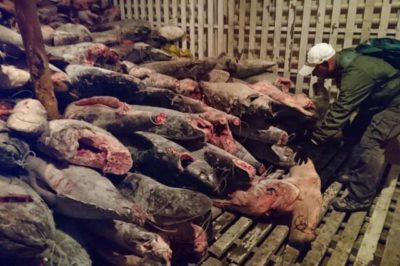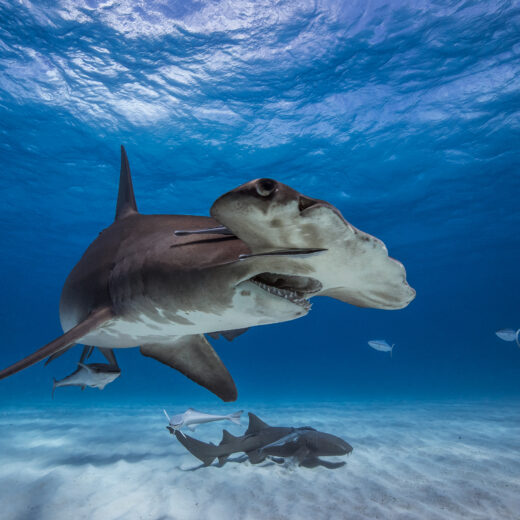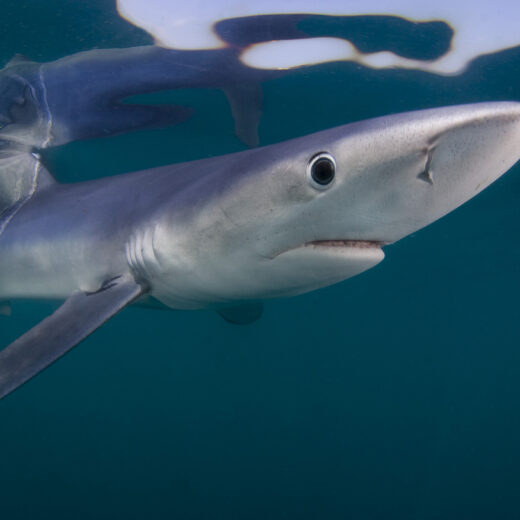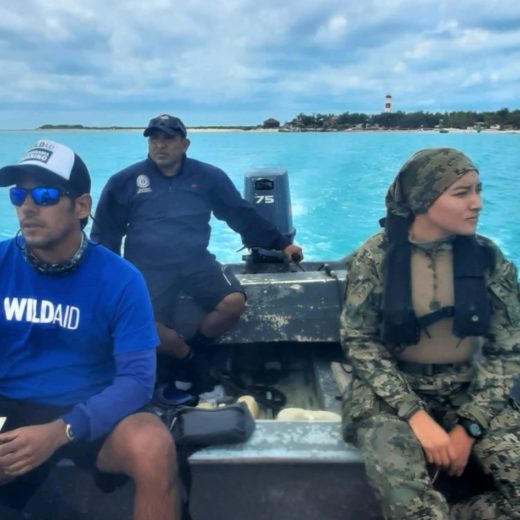
BY SILVIA BOR, WILDAID MARINE PROGRAM
Earlier this week, a Chinese cargo vessel was caught illegally transiting through the Galapagos Marine Reserve with a hull filled with thousands of sharks and tuna.
The cargo vessel, the Fu Yuan Yu Leng 999, was detected using the Galapagos National Park Service’s new AIS monitoring system—procured and installed by WildAid, WWF and Sea Shepherd earlier this year. The Galapagos National Park control center monitored its trajectory and vectored a patrol vessel to interdict. Galapagos Park Rangers and Ecuadorian Navy officials intercepted the vessel 34.5 miles off the coast of the island of San Cristobal and arrested its crew of 20. Upon inspecting its hold, they found 300 tons of frozen sharks and fish, including juvenile hammerhead and silky sharks.
Galapagos National Park director, Walter Bustos, said that the ship was the largest vessel ever caught in the reserve’s boundaries. The crew of the boat, which could face up to three years in prison, are currently being detained pending the elaboration of a case file and potential court proceedings. “Not necessarily all of the catch came from the marine reserve, but the fact that it included young sharks, even baby sharks, indicates that they could have been caught inside the reserve,” Ecuador’s environmental minister, Tarsicio Granizo was quoted as saying by AFP news agency.
An estimated 73 million sharks are killed each year for the illegal shark fin trade around the world. To stop shark finning in the Galapagos, WildAid works with Park Rangers and the Ecuadorian Navy to monitor the vast reserve and prevent illegal fishing. Last year, Ecuador announced that all its vessels, no matter their size, will be monitored in real time via AIS. Previous legislation mandated hourly monitoring only for larger vessels larger than 20 gross tons using satellite VMS, leaving small vessels to navigate unchecked. Together, WWF, Sea Shepherd and WildAid procured and installed AIS transceivers and software to complement the existing satellite technology system in the park’s control center to track all fishing and tourism vessels. Since the installation of electronic monitoring systems in 2009, park rangers have used the technology to capture and sentence more than 100 industrial and artisanal fishing vessels. This is the first interdiction of a foreign vessel since the installation of AIS this year and the announcement last year of a marine sanctuary at Darwin and Wolf to protect sharks.
WildAid also works in China to decrease demand for shark fins through targeted celebrity-led awareness campaigns. Our Say No to Shark Fin campaign previously aired on TV, video boards in subway and train stations, airports, and university campuses featuring Yao Ming, sports icon David Beckham, actor and director Jiang Wen, and actress Maggie Q. These campaigns have contributed to a reported 50-70% decrease in Chinese shark fin consumption.
WildAid has used its comprehensive marine protection model to decrease illegal fishing and protect nearly 3,000 marine species in the Galapagos Marine Reserve since 2002 thanks to the support of the Helmsley Charitable Trust, Conservation International, IGTOA, the Walton Family Foundation, Conservation International and WWF.
Stay in touch and get the latest WildAid updates.
SIGN UP


